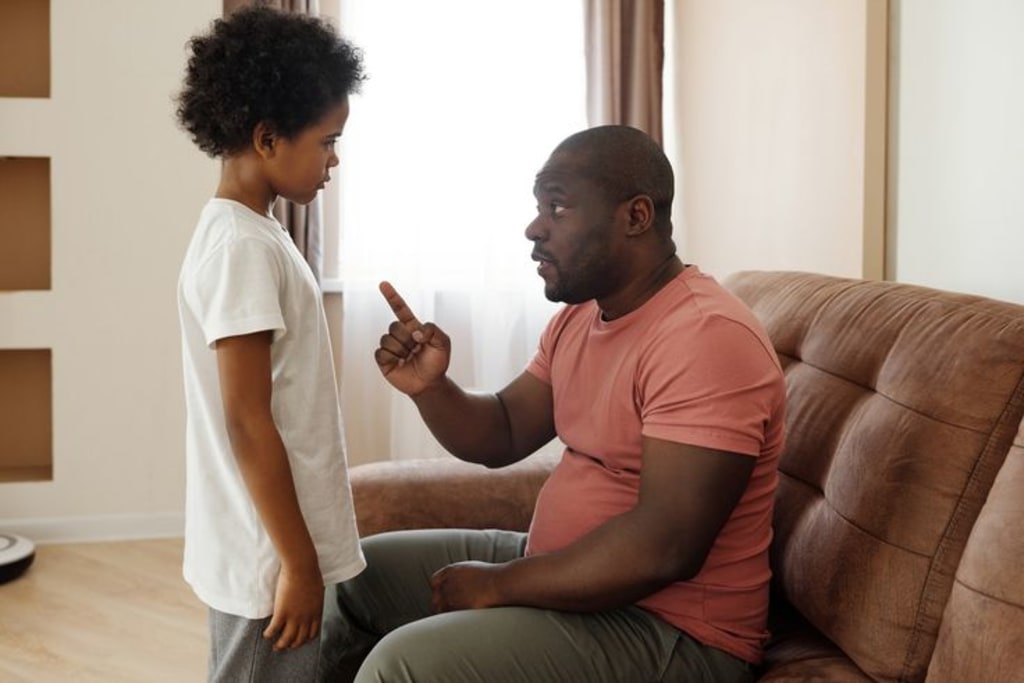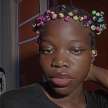
Many African homes, especially West African ones, have a certain style of parenting and most of the time, it isn’t a good one.
Children behave the way they do due to the way they were raised, and a lot of the ones who were raised in toxic households tend to have negative behavioural patterns. Many African parents raise their children using terrible disciplinary methods and many of them use Christianity or the bible to support their actions, but here’s the thing; they only look at the passages or verses that they feel support their actions but they turn a blind eye to the ones that disapprove of them.
The passage in the bible that African parents use is; Ephesians 6:1–3 (NKJV) “Children obey your parents in the Lord, for this is right. Honour your father and mother, which is the first commandment with promise: that it may be well with you and you may live long on the earth”, but they always ignore the verse right after that says; “And you, fathers, do not provoke your children to wrath but bring them up in the training and admonition of the Lord”. Colossians 3:21(NKJV) says the same thing; “Fathers, do not provoke your children, lest they become discouraged.”
Many African parents take their anger out on their children and give them replies in a harsh tone and this can cause the child to get angry and discouraged, and if the child is young, the child can pick up that behaviour and use it on others and eventually even back at their parents. And what does the bible say about this? In Proverbs 15:1 (NKJV), it says; “A soft answer turns away wrath, but a harsh word stirs up anger”, a soft answer will bring peace between people, you can’t use harsh words or a harsh tone and expect peace.
A lot of African parents also use the bible to guilt trip their children or make them feel bad about themselves to the extent that some children feel that God wouldn’t accept them because of the way they are and as a result, they turn themselves away from God or anything that has to do with religion. And what does the bible say about this? In Matthew 18:6 (NKJV) Jesus says; “Whoever causes one of these little ones who believe in Me to sin, it would be better for him if a millstone were hung around his neck, and he were drowned in the depth of the sea”, this verse underscores the severity of leading children astray or causing them to stumble.
Discipline? Or is it Child abuse?
Most African parents usually hit their child when they do something wrong as a form of discipline, but to what extent? A lot of African parents relieve their anger through hitting or beating their child whenever they get the chance to, and this can cause the child to have multiple bruises and injuries. They take the verse Proverbs 13:24 (NKJV) in the bible, that says; “He who spares his rod hates his son, but he who loves him disciplines him promptly”, to support their actions, but they haven’t really taken the time to understand that verse properly and how the verse fits with the rest of the bible.
You see, in the context of ancient Israel, the “rod” was a common tool used by shepherds to guide and protect their sheep in order for them not to go astray, and metaphorically it is a symbol of guidance, correction and protection rather than physical punishment.
What Is Child Abuse?
Child abuse refers to any action or inaction by a parent, caregiver or other adult that results in harm, potential harm, or threat of harm to a child. It encompasses a range of behaviours that can affect a child’s physical, emotional, psychological, and social well-being. The types of child abuse usually noticed in an African household are Physical Abuse and Emotional or Psychological Abuse.
Physical Abuse
This is any non-accidental physical injury to a child, such as hitting, beating, burning or biting. This includes severe discipline methods that cause physical harm.
A little smack and other forms of discipline can be tolerated, but using physical harm as a form of discipline is considered abuse and IT IS WRONG.
Emotional or Psychological Abuse
This involves actions or behaviours that harm a child’s self worth or emotional well-being, such as constant criticism, threats, rejection, withholding love, support, or guidance.
Ways That Parents May Emotionally Abuse Their Children;
Verbal Abuse:
• Yelling and Screaming: Frequently raising their voice in anger or frustration.
• Insults and Name-Calling: Using derogatory language to demean the child.
• Threat: Making threats of harm or abandonment to instil fear.
2. Manipulation:
• Gaslighting: Making the child doubt their own perceptions, memories and sanity.
• Blaming: Holding the child responsible for things that are not their fault.
• Guilt-Tripping: Using guilt to control or influence the child’s behaviour
3. Neglect:
• Withholding Affection: Deliberately withholding love and affection as a form of punishment.
4. Excessive Control:
• Overprotection: Stifling the child’s independence and ability to make their own decisions.
• Micromanaging: Controlling every aspect of the child’s life, from friends to activities.
5. Criticism and Ridicule:
• Constant Criticism: Finding fault with everything the child does, regardless of effort or outcome.
• Public Humiliation: Ridiculing the child in front of others.
6. Rejection and Isolation:
• Rejection: Making the child feel unwanted or unloved
• Isolation: Preventing the child from forming healthy relationships with peers or other family members.
7. Parental Inconsistency:
• Unpredictable behaviour: Alternating between affection and hostility, creating a confusing and unstable environment.
• Inconsistent Discipline: Punishing or rewarding the child unpredictably.
8. Using the Child for the Parent’s Needs:
• Parentification: Making the child take on adult responsibilities or emotional burdens.
• Living Vicariously: Pressuring the child to fulfil the parent’s unrealised ambitions.
9. Invalidation:
• Dismissing Feelings: Ignoring or trivializing the child’s emotions or experiences.
• Mocking: Making fun of the child’s feelings, interests or aspirations.
Long-Term Effects of Physical Abuse
Physical abuse can have severe and long lasting effects on children, including:
• Physical Injuries: Bruises, fractures, burns and other injuries.
• Emotional and Psychological Trauma: Anxiety, depression, PTSD, and other mental health issues.
• Developmental Delays: Problems with cognitive and emotional development.
• Behavioural Problems: Aggression, withdrawal, and difficulty forming healthy relationships.
Signs of Physical Abuse
• Unexplained injuries or bruises.
• Fear of going home or fear of parents.
• Wearing long sleeves or pants to cover injuries, even in warm weather.
• Behavioural changes such as aggression or withdrawal.
Long-Term Effects of Emotional Abuse
Emotional abuse can have profound and lasting impacts on a child’s development and well-being:
• Mental Health Issues: Anxiety, depression, low self-esteem, and PTSD.
• Difficulty Forming Relationships: Trust issues and problems with intimacy.
Behavioural Problems: Aggression, withdrawal, and difficulties in school.
• Emotional Dysregulation: Difficulty managing emotions and coping with stress.
Signs of Emotional Abuse
• Changes in Behaviour: Sudden shifts in mood, withdrawal or aggression.
• Low Self-Esteem: Negative self-talk, and feelings of worthlessness.
• Fearfulness: Fear of parents or reluctance to go home.
• Developmental Delays: Lags in emotional, social or academic development.
And a lot of parents blame the children for their behaviour and/or simply assume that they are moving around with friends who have a negative influence, when this is the real problem causing the children to behave the way they do.
Another common form of emotional abuse in African households is shaming your children in discussions with other people and this behaviour can be detrimental to a child’s emotional and psychological well-being.
Effects of Shaming on Children
1. Low Self-Esteem: Constant shaming can lead to feelings of worthlessness and a poor self image.
2. Emotional Distress: Children who are shamed may experience anxiety, depression and chronic stress.
3. Social Withdrawal: Shamed children may withdraw from social interactions out of fear of further humiliation.
4. Trust Issues: This behaviour can damage the trust between parent and child, making the child feel unsafe and unsupported.
5. Behavioural Problems: Children who are shamed may develop behavioural issues, such as aggression or defiance, as a way to cope with their feelings.
Characteristics of Shaming
Shaming can take various forms, including:
• Public Humiliation: Criticizing or ridiculing the child in front of others.
• Negative Comparisons: Comparing the child unfavourably to others, causing them to feel inadequate or not good enough.• Highlighting Failures: Focusing on and discussing the child’s mistakes or shortcomings.
• Mocking: Making fun of the child’s feelings, interests or achievements.
Long Term Consequences
• Impaired Emotional Development: Difficulty in managing emotions and forming healthy relationships.
• Academic Issues: Reduced motivation and performance in school due to low self-worth.
• Mental Health Problems: Increased risk of mental health issues such as depression, anxiety, and low self-esteem.
A lot of parents wonder why their children don’t speak to them about their lives, come to them for advice, or even share anything with them at all, well I’ve given you some reasons why.
But here’s the thing, the parents who wonder why their children are acting this way are the same ones who get mad at the children for acting the way they are, and they force them to speak or to share, they force the children with threats or even beatings, and this happens mostly to children who are suffering from depression. You can’t constantly threaten your child or beat them up and still think that they they would want to share anything with you or even socialise with you, it’s just not possible.
Being Young Doesn’t Mean That Children Don’t Deserve Respect Too
To show respect to elders is a norm, however, a lot of these elders take advantage of this principle. A lot of elders disrespect the youngsters because they know they are not able to talk back at them, and if they do talk back they are instantly considered rebels.
Some elders are very rude and say rude things to the young ones and they will never stop to consider how their words can have a negative impact on the youngsters.
Being Young Doesn’t Make A Child’s Opinion Rubbish
A lot of elders believe that they can never be wrong, they have that mindset of; “I’m old, you’re young” or “I’m big, you’re small” and they will never accept responsibility for their actions. They never see a young person’s opinion as valid because of their age, and they treat their words like trash. The passage of time alone does not guarantee wisdom, maturity or immunity from making mistakes. You can learn valuable things from people who are much younger than you, young people’s opinions are equally valid.
I know that I’m going to get a lot of backlash for writing this, but guess what, it’s the truth and it has to come to light :)
STOP ABUSING YOUR CHILDREN!
About the Creator
SASSBY
Hi, I'm a writer who speaks her mind regardless of what others think, I love justice ans like to fight for what is right. Wrong things shouldn't be normalised and tolerated.
Enjoyed the story? Support the Creator.
Subscribe for free to receive all their stories in your feed. You could also pledge your support or give them a one-off tip, letting them know you appreciate their work.






Comments
There are no comments for this story
Be the first to respond and start the conversation.